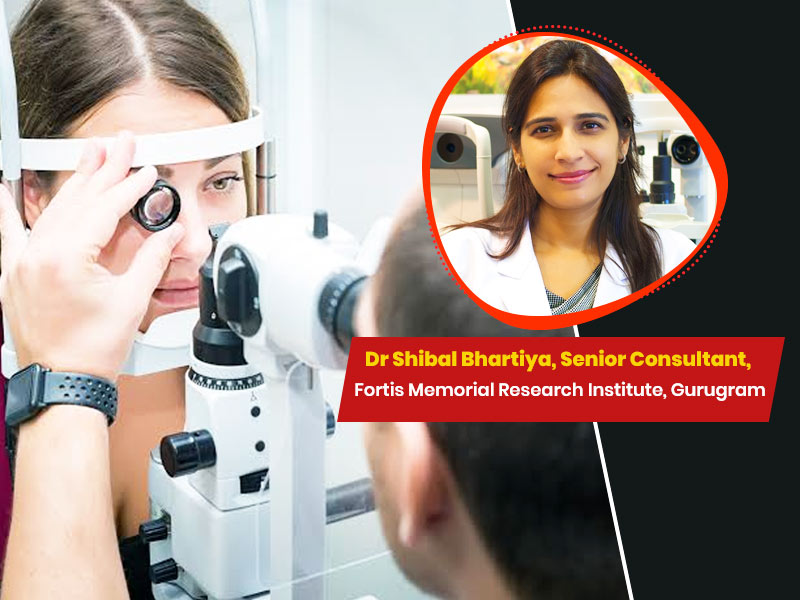
Our eyes are not only the windows to our soul but also offer us the beautiful gift of sight with which we view the world around us. But did you know that the second most common cause of blindness worldwide is a ‘silent’ condition that creeps up on you slowly? This condition is known as Glaucoma. According to the World Health Organisation, an estimated 4.5 million people in the world are blind due to this disease. Glaucoma is caused by slow but irreversible damage to the optic nerve (the nerve that connects the eye to the brain and helps us see). If left untreated, it can lead to blindness. On the occasion of World Glaucoma week 2022, Onlymyhealth editorial team spoke to Dr. Shibal Bhartiya, Senior Consultant, Fortis Memorial Research Institute, Gurugram, to know everything about glaucoma.
Table of Content:-
In India, glaucoma is the most prominent cause of irreversible blindness. Nearly 12 million people in our country suffer from glaucoma and almost 10% of this population is blind due to the disease. What is more shocking is that 9 out of 10 cases of glaucoma remain undiagnosed! This is because, in the initial stages, it does not cause any symptoms. By the time symptoms appear, the condition is in its moderate to advanced stage. Hence, many people do not realise that they have glaucoma unless it is picked up during a comprehensive eye test.
Are there any types of glaucoma?

The most common type of glaucoma is primary open angle glaucoma and it develops slowly over many years. It increases with advancing age and affects the sides of your vision or peripheral vision first. Though symptoms are uncommon in the beginning, some things to watch out for include blurred vision or the presence of rainbow-coloured circles around bright lights.
The damage to the optic nerve in glaucoma is mainly caused due to an excessive collection of fluid in the eye, which increases the pressure within the eye (intraocular pressure). But glaucoma also develops in those with normal intraocular pressure. Usually, both eyes may be affected eventually, but it may be worse in one eye.
Very rarely, glaucoma can develop suddenly (acute angle closure glaucoma) and is associated with severe eye pain, redness in the eye, headache, nausea/vomiting or tenderness around the eyes.
Also read: What Is Glaucoma? Here Are Its Symptoms, Causes And Treatment
How do you know if you are at risk?
Though glaucoma can occur at any age, all individuals above 40 years of age must get basic eye tests done regularly by an ophthalmologist. Check your family history. If your parent or sibling has or had glaucoma, you are more likely to develop it too. Other medical conditions such as short- or long-sightedness, high blood pressure, diabetes and sickle cell anaemia or certain eye surgeries can also increase your chances of developing glaucoma.
Glaucoma diagnosis
Since vision once lost cannot be restored, early detection is essential. Get your eyes tested at least once in two years by an ophthalmologist. Glaucoma can normally be detected even before symptoms appear during a comprehensive eye test conducted by an optometrist or an eye doctor (ophthalmologist). Simple tests can help detect increased pressure in the eye (tonometry), optic nerve damage (ophthalmoscopy) and vision loss (perimetry). If needed, your doctor will also conduct other tests which check the angle between the iris and cornea (gonioscopy) or the thickness of the cornea (pachymetry).
Glaucoma treatment

The treatment for glaucoma will depend upon the severity of the condition. You may be treated with eye drops (you may be prescribed more than one), laser therapy or surgery (filtering surgery, insertion of a drainage shunt or minimally invasive glaucoma surgery). Most of these methods work by decreasing the intraocular pressure. You must follow the medication schedule strictly and consult your doctor regularly (follow-up visits) to ensure that the treatment is effective.
Also read: World Glaucoma Week 2022: Glaucoma Symptoms You Must Not Ignore
Are there any lifestyle changes that can help in managing glaucoma?
Although, there is no preventive remedy for glaucoma except regular eye exams, you can follow certain measures to manage your eye health. These include a healthy diet containing vitamins and nutrients necessary for good eye health (e.g. zinc, copper, selenium and vitamins A, C, E), appropriate exercise (after consulting your doctor), limited caffeine intake, frequent but small sips of fluids, elevated sleeping posture (head slightly raised) and strict adherence to the medication regimen.
But as we all know, a stitch in time saves nine. Hence, make it a point to carry out regular eye exams after the age of 40 to detect glaucoma before it claims your eyesight.
Also watch this video
How we keep this article up to date:
We work with experts and keep a close eye on the latest in health and wellness. Whenever there is a new research or helpful information, we update our articles with accurate and useful advice.
Current Version